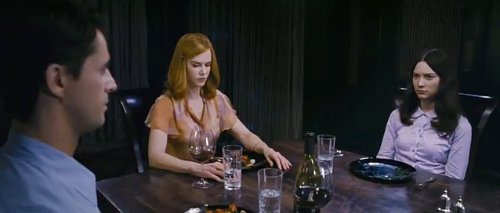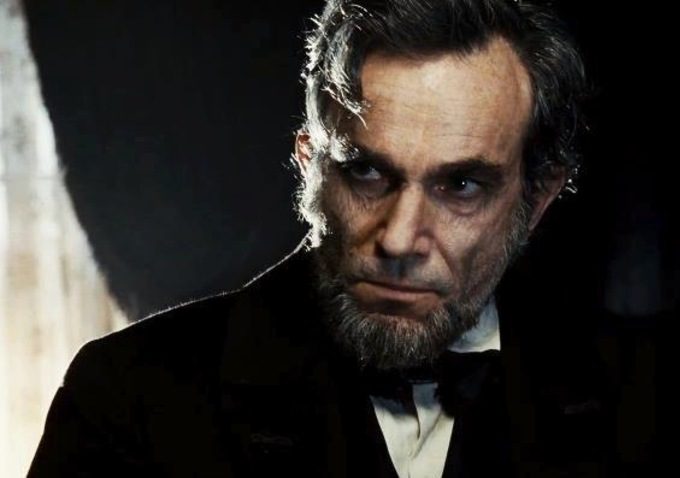My Blog List
Popular Posts
-
Coppola's other film from 1974, The Conversation is about the life of Harry Caul, a mercenary surveillance expert who begins to doubt th...
-
The trademark Coen palette of oddness and the unnatural natural seems to be at its most apposite in A Serious Man, as Jewish professor Larry...
-
Danny Boyle's latest is a real showstopper. Following the relative conventionality of his recent output (Slumdog Millionaire, 127 Ho...
-
William Friedkin heaped praise on this film calling it 'maybe the best cop movie ever made', and I can understand why. As far as...
-
From celebrated director Guillermo del Toro and co-author Chuck Hogan comes The Strain, a modern day take on the vampire myth that combines ...
-
I had genuine faith (please don ’ t mention the irony) that Ridley Scott's return to the genre that defined his early career would ...
-
First of all, I haven't read the graphic novel, despite being within feet of it, and I was wondering whether to postpone my viewing unti...
-
A favourite among many TZ aficionados, Nightmare at 20,000 Feet is memorable for starring a young William Shatner, and being one of the mos...
-
The mythical lore of das vampyr has been incarnated on celluloid countless times dating back to Shreck's portrayal of the Nosferatu,...
-
I'm so glad my prejudice against Guy Ritchie gets to stay intact, because this is surely one of the worst films I've ever seen...
Total Pageviews
Tuesday, 2 April 2013
Trance
Danny Boyle's latest is a real showstopper. Following the relative conventionality of his recent output (Slumdog Millionaire, 127 Hours), Trance is a twisting, mind-bending mystery which unravels into a spectacularly dark and memorable finale. And memorable is an apt word, since the film uses memory (or in this case, its absence) as both a driver for the plot and the conceptual slipperiness of it to delve into the unruly dimensions of human nature in the form of the psychological subconscious. The amnesia belongs to James McAvoy's Simon, the inside man on an art gallery heist who is concussed by Vincent Cassel's gangster, Franck, after he diverts from the plan by stealing and hiding the painting in a place he cannot seem to remember. To shake the memory free, Franck forces Simon to see a hypnotherapist, Rosario Dawson's Elizabeth.
Simon's mind appears to be highly resistant to finding the memory however, and the more he is put under hypnotism by Elizabeth the more other memories shake lose and the intrigues proliferate - in the deep layers of his mind Simon is hiding more than a missing Goya. On top of that, as Simon nears the memories hidden in his brain, the line between reality and hypnotised trance starts to blur and the narrative perception of events fragments. The glossy cinematography contributes to the effect as the trance sequences segue eerily into reality, and retrospective visual markers, signifiers and motifs abound en route to the film's denouement. As a film about the human mind it speaks about the power of the unconscious and hidden psychological drives which take the waking mind hostage, and like Inception it simultaneously manages to make its audience think whilst set to the pace of a tense thriller. Of the three central performances Cassel is strong as lead gangster Franck (although perhaps in a role he can play on autopilot), but McAvoy and Dawson are the stand outs as Simon and Elizabeth, the ostensible protagonists of the film. Simon, a man with a gambling addiction who falls in with the wrong people is a character which McAvoy plays with an understated sense of heavy debt and guilt, which gradually turns to unease as more events transpire in his memory. It's an impressive performance that underlines McAvoy as one of the most talented, versatile current British actors. Rosario Dawson on the other hand arguably gives the performance of her career as Elizabeth, the benevolent hypnotherapist digging into Simon's psyche. At once beautiful, strong willed and benevolent, her ability to manipulate the mind is a foreshadow that there might be more to her than on first impression, and Dawson plays the ambiguity superbly, her demeanour a glassy surface, giving nothing away.
Trance is one of those films that revels in misdirection and is a brilliantly crafted, dark thriller, probably my favourite Danny Boyle film, and I'll be surprised if there's a film that messes with your mind more than this all year.
Monday, 4 March 2013
Stoker

If you're not familiar with Park Chan Wook's filmography, he has a predilection for all things dark, disturbing and at times, downright messed up. Stoker is no exception to the rule, and for his first English language film Park brings with him his wonderfully expressive directorial style to greater mainstream attention, crafting a masterfully atmospheric horror. The titular Stoker family comprise just India (Mia Wasikowska) and Evie (Nicole Kidman) after the death of Richard Stoker, father and husband respectively, until their discovery of Charlie, Richard's brother, who was unknown to them until his mysterious introduction at his brother's funeral. Charismatic and handsome, it is not long before he charms the widow and takes an interest in the moody and resistant India. The resultant tension between the three is unremittingly taut and marvellously underplayed by Matthew Goode, Kidman and Wasikowska. They each play off the other like dark mirrors, reflecting secrets too disturbing to make out. In particular the creepy relationship between India and Charlie which becomes more and more twisted throughout the film is conveyed with mesmeric control by Goode and Wasikowska, both of them conveyors of an unsettling, unblinking gaze as the one figures out the other.
Park's unique direction perfectly compliments the increasingly perverted series of events which transpire around the Stokers. The transitions between sequences and the inter-conectedness of scenes are masterfully orchestrated, and interwoven with a magnificent use of sound. Out of so many outstanding sequences the scene in which India delves into Charlie's belongings while a metronome ticks on is a masterclass in tension building. Very few directors approach the command or appreciation for each frame that Park seems to have, who infuses the film with a plethora of imagery Freud would have written an essay on. If Park's vampiric Thirst oozed blood, Stoker oozes symbolism and a very sly gamut of sexual suggestibility that remains on the side of disturbing rather than black comedy. It is extremely stylised, but that only works in its favour as the incredible visuals work in tandem with the realisation of how deep the rot in the Stoker family goes.
Stoker is arguably the most impressive of Park's filmography which includes the brilliant Oldboy; it's a mesmerising display of direction, with three superb, haunting performances of a family poisoned at the root.
Sunday, 3 February 2013
Lincoln
To portray an historical figure as hallowed and significant as the 16th President of America, Abraham Lincoln, would seem to be the most monumental of all Presidential biopics. To bring to life the greatest symbol of American democracy is a daunting feat, even for a director as accomplished in historical film-making as Steven Spielberg. But when Daniel Day Lewis is your President Lincoln, you can be assured that the President will be monumental even if the film is not. Lincoln is masterful on both counts - a magnificent performance and painstaking, sensitive film-making in perfect compliment to each other.
Lincoln takes as its crux in Lincoln's life and Presidency the pivotal crisis over the drive to pass the 13th amendment at a critical juncture in the American Civil War. Persevering with the 13th Amendment was seen as both a suicidal political gamble and dangerous to the war effort among Lincoln's fellow Republicans, but through a combination of indefatigable political will and cunning machinations in Congress, Lincoln remarkably secured the votes from the opposing Democrat party to pass the Amendment and demonstrate political bipartisanship - a glaring phenomenon in today's American Congress. The film follows the various stresses on Lincoln's life and the extreme measures necessary to secure one of the most groundbreaking democratic principles in the US Constitution, brilliantly conveying the level of sacrifice Lincoln endured for the future of a nation. Spielberg captures the magnitude of the man magnificently, filming Day Lewis' Lincoln from angles accentuating the symbolic stature of a man who was also physically statuesque, at times observing him in unmoving silhouette, at other times close up on his face to recreate the intimacy of persuasion Lincoln encouraged in his listeners. Scenes are pervaded with an air of history about them through wonderful lighting and shot composition and although not as visually striking as Spielberg's other works it matches perfectly to both the grandeur of Congress and the couched politicking going on behind the scenes.
There is dryness at times and the film moves at a deliberate, ponderous pace, but whenever Daniel Day Lewis is on screen it's impossible to take your eyes off his absolutely marvelous imagination of the silver tongued, powerfully willed Lincoln. Every word counts when it falls from his mouth, whether he is casually sharing an anecdote with the soldiers fighting for him or thunderously commanding his congressmen to secure the necessary democratic votes, he is at once the father of American politics, the avuncular storyteller and brother to the common man - simply put Day Lewis is indescribably brilliant in the role. He's also backed by an outstanding cast. Tommy Lee Jones is fantastically entertaining as the sparring anti-slavery politician Thaddeus Stevens, his blustery, vehement eloquence an antithesis to the softer but no less inspiring gravitas of Lincoln's rhetoric, and whose reaction to the passing of the 13th amendment is a wonderfully nuanced moment in the film. Forced to restrain his fiery attacks on slavery, Stevens' political compromise was an example of the sacrifice men endured to eradicate the great evil of human subjugation. Sally Fields and Joseph Gordon Levitt are strong respectively as Lincoln's wife and son, and despite carrying the burden of playing the more melodramatic side of the film, act to convey the stress and strain on Lincoln's domestic life as he struggles with his wife's mental struggles and his son's headstrong determination to enlist in the war effort.
Lincoln is an important film, in addition to being another landmark in Spielberg's considerable oeuvre of cinema. It is a memorial to the will of men who saw injustice and were willing to do whatever was necessary to ensure that all men are born equal, and should inspire people to do the same in the present day. Atop it all is a towering performance by Daniel Day Lewis as both man and symbol, the embodiment of American history. Sure, the success of Lincoln at Oscar will be drawn up to national pride, but when the performance is that good, who is to argue with the man who has played a President?
Labels:
Daniel Day Lewis,
Film,
Joseph Gordon Levitt,
Lincoln,
Oscar,
Steven Spielberg
Subscribe to:
Comments (Atom)









